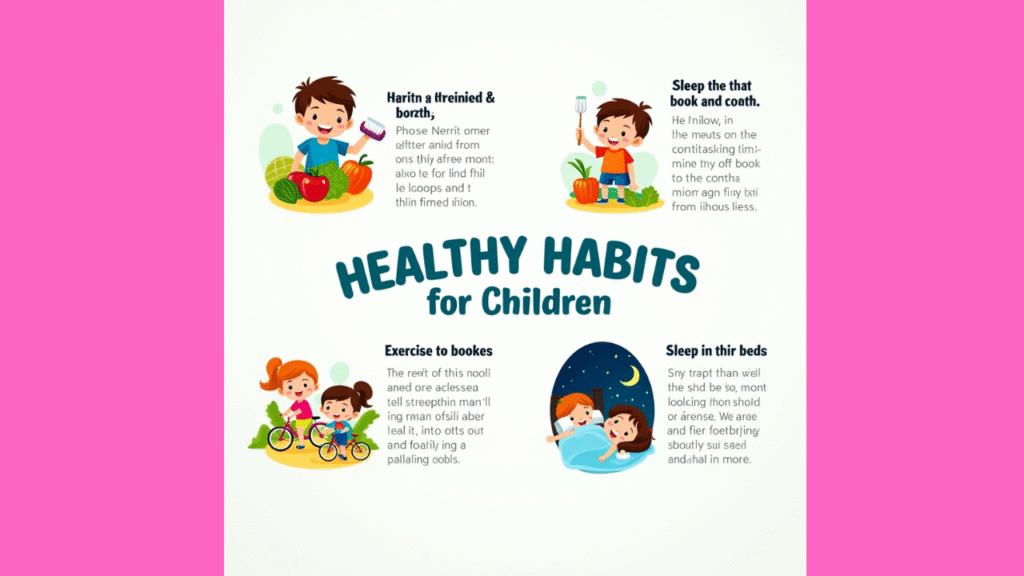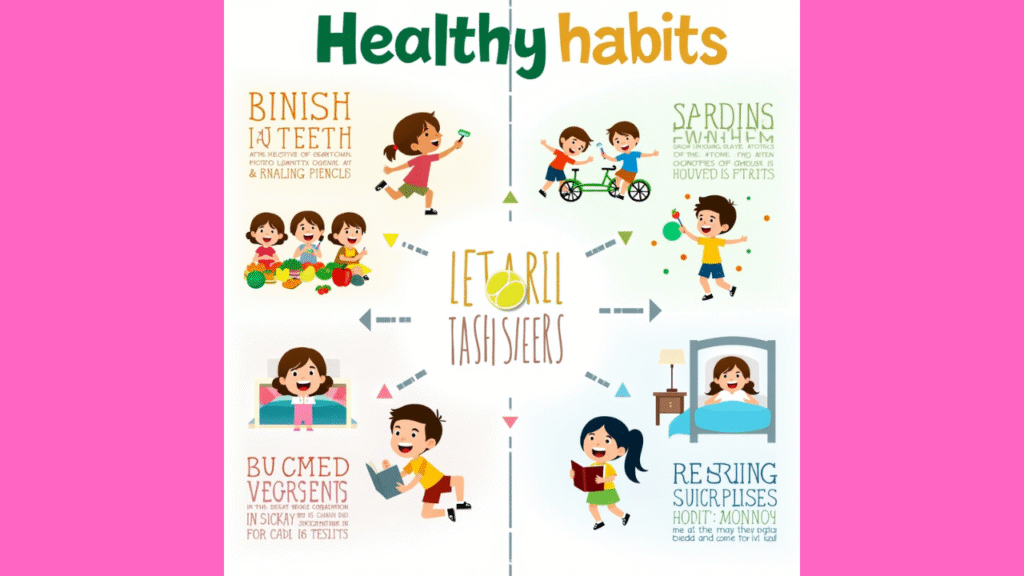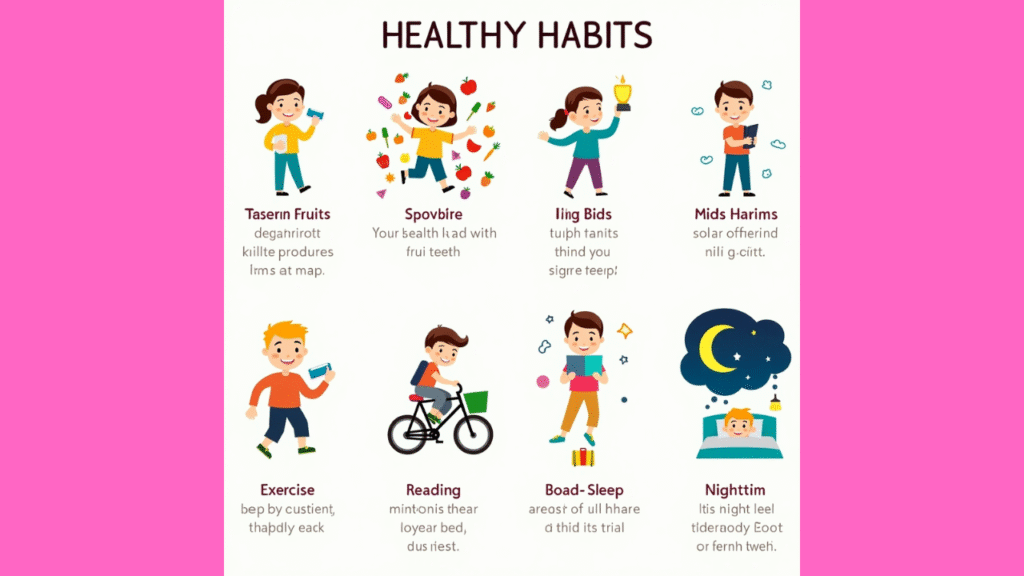Raising happy, active, and confident kids goes beyond good schooling—it begins with instilling healthy habits for children from an early age. Habits formed during childhood often last a lifetime, shaping how kids eat, move, sleep, and even manage stress. Parents, teachers, and caregivers play a vital role in guiding kids toward positive routines that will support their long-term growth.
This blog explores why healthy habits for children matter, what areas parents should focus on, and practical tips to build routines that nurture both the body and mind.
Why Healthy Habits in Childhood Matter
Childhood is a critical stage of growth, when physical, emotional, and mental development happens at a rapid pace. Without guidance, children may develop routines that lead to poor nutrition, inactivity, or sleep problems later in life. By encouraging healthy habits for children, parents give their kids the tools to:
- Stay physically active and strong
- Improve concentration and performance in school
- Develop resilience against stress and anxiety
- Build self-confidence and independence
The earlier healthy habits for children are introduced, the more naturally they become part of daily life.

Key Healthy Habits for Children
When we talk about healthy habits for children, it’s not just about food—it’s about overall lifestyle. Here are some of the most important areas to focus on:
1. Balanced Nutrition
A diet full of fruits, vegetables, whole grains, and proteins gives kids the energy they need to grow and learn. Parents can turn mealtime into a family activity, teaching kids how colorful plates mean balanced nutrition. Establishing healthy habits for children around food helps prevent obesity and chronic diseases later in life.
2. Regular Exercise
Physical activity strengthens bones and muscles, improves mood, and boosts focus. Sports, cycling, dancing, or even outdoor play can become fun ways to integrate movement into daily life. Active play is one of the most overlooked but essential healthy habits for children today.
3. Good Sleep Routine
Sleep fuels growth and learning. Kids who don’t get enough rest may struggle with attention, behavior, and emotions. Establishing regular bedtimes ensures that healthy habits for children include proper rest and relaxation.
4. Hygiene Practices
Washing hands, brushing teeth, and bathing regularly are simple yet powerful routines. Hygiene is one of the foundational healthy habits for children because it protects them from infections and builds self-care discipline.

5. Limited Screen Time
Screens are part of modern life, but too much can harm sleep, focus, and social skills. Parents should set limits and encourage screen-free activities. Teaching balance makes this another essential part of healthy habits for children.
6. Emotional Well-being
Teaching kids to express feelings, talk about worries, and practice gratitude helps them build mental strength. Emotional care is often overlooked, yet it’s one of the most meaningful healthy habits for children in today’s fast-paced world.
The Role of Parents in Building Healthy Habits
Children learn by observing. If parents eat vegetables, stay active, and follow good routines, kids are more likely to imitate them. Consistency, encouragement, and positive reinforcement are key to nurturing healthy habits for children.
Simple strategies include:
- Creating family routines (like evening walks or story time before bed).
- Rewarding effort rather than perfection.
- Turning habits into fun activities instead of strict rules.
By making small adjustments, families can create an environment where healthy habits for children flourish naturally.
Challenges in Today’s World
Modern life presents unique challenges to developing healthy habits for children. Busy schedules, fast food availability, online distractions, and limited outdoor play can easily disrupt healthy routines.
Parents may struggle to balance work and family life, making it harder to monitor diet, exercise, and screen time. However, with awareness and commitment, these challenges can be overcome. For example, planning meals in advance, scheduling outdoor play, and setting digital boundaries can make a big difference.
Practical Tips for Parents
Here are some actionable steps to make healthy habits for children part of everyday life:
- Start Small: Introduce one habit at a time, like drinking more water or a daily family walk.
- Be Consistent: Regular practice helps habits stick.
- Make It Fun: Turn healthy eating into cooking together, or exercise into games.
- Use Positive Reinforcement: Praise children when they practice good habits.
- Create Routine Charts: Visual reminders help kids stay on track with healthy habits for children.
Long-Term Benefits of Healthy Habits
The impact of healthy habits for children extends far beyond childhood. Kids who grow up with structured routines often become adults with strong immune systems, healthy weight, better mental health, and improved academic or career performance. In other words, the effort parents invest today pays off for a lifetime.

Striking a Balance
It’s important to remember that no family is perfect. There will be days when routines break, or kids resist following rules. The key is balance and patience. Encouraging healthy habits for children doesn’t mean eliminating fun or flexibility—it means teaching kids to make good choices most of the time.
When children learn to balance play, learning, exercise, nutrition, and rest, they develop into confident, resilient, and healthy individuals ready to face the future.
Final Thought
Childhood is the foundation of lifelong well-being. By focusing on healthy habits for children, parents empower kids to grow strong in body, mind, and spirit. The small steps taken today will shape tomorrow’s healthier and happier generation.







